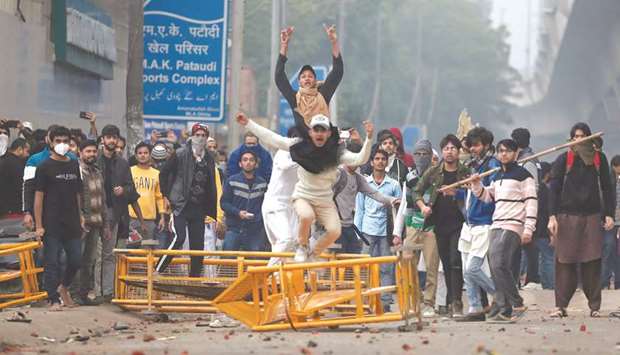Protests against a new citizenship law that opponents say is anti-Muslim spread to other regions yesterday, a day after two people were shot dead by police in the northeast of the country, the epicentre of days of demonstrations.
Police with batons and firing tear gas clashed with hundreds of students in New Delhi, television pictures showed, as Muslim protesters set fire to placards in Amritsar and other rallies were held in Kolkata, Kerala and Gujarat.
The protests in Guwahati in the northeast, where medical staff earlier confirmed two people were shot dead out of 26 who were admitted to hospital with gunshot wounds on Thursday night, prompted Modi and Japanese counterpart Shinzo Abe to postpone a summit in the area slated for tomorrow.
With four people still in a critical condition yesterday, the UN human rights office in Geneva called on India “to respect the right to peaceful assembly, and to abide by international norms and standards on the use of force when responding to protests.”
In Guwahati, rioters on Thursday left a trail of destruction, torching vehicles, blocking roads with bonfires and hurling stones at thousands of riot police who were backed up by the military.
With the Internet suspended in many areas of the city, several thousand people gathered for a sit-in protest yesterday and no major incident was reported.
Many cash machines had no money, shops were shuttered and petrol stations closed.
Authorities in Meghalaya cut off mobile Internet and imposed a curfew in parts of the capital Shillong.
Around 20 people were hurt in clashes there yesterday, reports said. “They can’t settle anyone in our motherland. This is unacceptable. We will die but not allow outsiders to settle here,” protester Manav Das said in Guwahati.
“We will defeat the government with the force of the people and the government will be forced to revoke the law,” said local activist Samujal Battacharya.
The Citizenship Amendment Bill (CAB) — approved this week — allows for the fast-tracking of applications from religious minorities from neighbouring countries but not Muslims.
For Islamic groups, the opposition and rights organisations, it is part of Modi’s Hindu nationalist agenda to marginalise India’s 200mn Muslims. Modi denies this and says that Muslims are not covered by the legislation because they have no need of India’s protection.
The US state department urged India to “protect the rights of its religious minorities”, according to Bloomberg.
The UN human rights office said it was concerned the law “would appear to undermine the commitment to equality before the law enshrined in India’s constitution”. But many in the northeast object for different reasons, fearing that immigrants — many of them Hindus — will become citizens, taking jobs and diluting the area’s cultural identity.
The chief ministers of several states — West Bengal, Punjab, Kerala, Madhya Pradesh and Chhattisgarh — have said they will not implement the law.
West Bengal leader Mamata Banerjee, who has called for major protests in Kolkata on Monday, said Modi wanted to “divide the nation”.
“It is completely unconstitutional and goes against the idea of India,” Aditya Mukherjee, a professor at Jawaharlal Nehru University, told the NDTV channel.

Protesters shout slogans as they stand amidst the tear gas during a protest against the citizenship law outside the Jamia Millia Islamia University in New Delhi yesterday.
